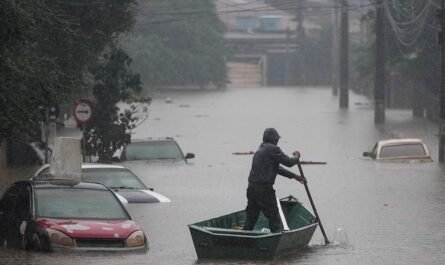Seven rabbis and peace activists were arrested on Friday near the border with Gaza after they tried to take food supplies into the territory, according to two participants and the campaign group that organized the effort.
The detainees were among a group of roughly 30 rabbis and activists from Israel and the United States who were stopped by police officers as they tried to reach the Erez crossing, a major transit point between Israel and northern Gaza.
Organized by Rabbis for Ceasefire, a peace movement based in the United States, the effort was intended to build support for a truce and to highlight rising reports of starvation in Gaza. A global authority on food security, the Integrated Food Security Phase Classification initiative, has predicted an imminent famine in northern Gaza, the area of the territory closest to Erez.
The protest was timed to coincide with the week of Passover, a Jewish festival that celebrates the biblical story of the liberation of Jews from slavery in ancient Egypt.
“We were making the point that Jewish liberation is bound up with Palestinian liberation, that we want freedom for all,” said Toba Spitzer, a rabbi from Boston who attended the protest but was not arrested.
The group had tried to drive into Gaza with a pickup truck carrying half a ton of rice and flour but was stopped roughly a third of a mile from the border, Rabbi Spitzer said. The effort was largely symbolic and the organizers expected it to fail given the restrictions along the border; the supplies will now be donated to needy Palestinians in the Israeli-occupied West Bank, Rabbi Spitzer said.
The Israeli police did not respond to requests for comment.
The author Ayelet Waldman of Berkeley, Calif., was among those arrested, her husband, the author Michael Chabon, said on Instagram.
There are widespread food shortages in Gaza. Israeli restrictions on where convoys can enter the strip, Israeli bombardment and widespread damage to roads, the collapse of Gazan agriculture, and a breakdown in law and order have all made it harder to distribute aid safely.
Aid groups and United Nations officials have accused Israel of systematically limiting aid delivery. Israel denies the assertion, blaming the shortages on logistical failures by aid groups, and has recently increased the number of trucks entering the strip.
Israeli officials say that the Erez crossing, which was primarily used for pedestrian traffic before the war, is difficult to use for aid delivery because it lacks the right infrastructure and was also badly damaged during the Hamas-led raid on Israel in October.
A majority of Jewish Israelis oppose the delivery of more aid to Gaza, according to a poll conducted in February by the Israel Democracy Institute, a Jerusalem-based research group.
Israeli protesters regularly gather at another crossing point farther south, trying to block aid convoys entering Gaza.




